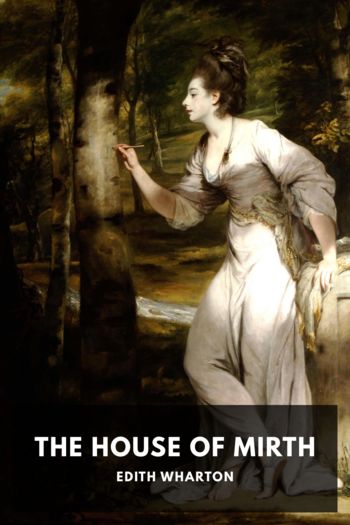The Age of Innocence by Edith Wharton (android based ebook reader .txt) 📕

- Author: Edith Wharton
Book online «The Age of Innocence by Edith Wharton (android based ebook reader .txt) 📕». Author Edith Wharton
Beyond the small and slippery pyramid which composed Mrs. Archer’s world lay the almost unmapped quarter inhabited by artists, musicians and “people who wrote.” These scattered fragments of humanity had never shown any desire to be amalgamated with the social structure. In spite of odd ways they were said to be, for the most part, quite respectable; but they preferred to keep to themselves. Medora Manson, in her prosperous days, had inaugurated a “literary salon”; but it had soon died out owing to the reluctance of the literary to frequent it.
Others had made the same attempt, and there was a household of Blenkers—an intense and voluble mother, and three blowsy daughters who imitated her—where one met Edwin Booth and Patti and William Winter, and the new Shakespearian actor George Rignold, and some of the magazine editors and musical and literary critics.
Mrs. Archer and her group felt a certain timidity concerning these persons. They were odd, they were uncertain, they had things one didn’t know about in the background of their lives and minds. Literature and art were deeply respected in the Archer set, and Mrs. Archer was always at pains to tell her children how much more agreeable and cultivated society had been when it included such figures as Washington Irving, Fitz-Greene Halleck and the poet of “The Culprit Fay.” The most celebrated authors of that generation had been “gentlemen”; perhaps the unknown persons who succeeded them had gentlemanly sentiments, but their origin, their appearance, their hair, their intimacy with the stage and the Opera, made any old New York criterion inapplicable to them.
“When I was a girl,” Mrs. Archer used to say, “we knew everybody between the Battery and Canal Street; and only the people one knew had carriages. It was perfectly easy to place anyone then; now one can’t tell, and I prefer not to try.”
Only old Catherine Mingott, with her absence of moral prejudices and almost parvenu indifference to the subtler distinctions, might have bridged the abyss; but she had never opened a book or looked at a picture, and cared for music only because it reminded her of gala nights at the Italiens, in the days of her triumph at the Tuileries. Possibly Beaufort, who was her match in daring, would have succeeded in bringing about a fusion; but his grand house and silk-stockinged footmen were an obstacle to informal sociability. Moreover, he was as illiterate as old Mrs. Mingott, and considered “fellows who wrote” as the mere paid purveyors of rich men’s pleasures; and no one rich enough to influence his opinion had ever questioned it.
Newland Archer had been aware of these things ever since he could remember, and had accepted them as part of the structure of his universe. He knew that there were societies where painters and poets and novelists and men of science, and even great actors, were as sought after as Dukes; he had often pictured to himself what it would have been to live in the intimacy of drawing-rooms dominated by the talk of Mérimée (whose Lettres à une Inconnue was one of his inseparables), of Thackeray, Browning or William Morris. But such things were inconceivable in New York, and unsettling to think of. Archer knew most of the “fellows who wrote,” the musicians and the painters: he met them at the Century, or at the little musical and theatrical clubs that were beginning to come into existence. He enjoyed them there, and was bored with them at the Blenkers’, where they were mingled with fervid and dowdy women who passed them about like captured curiosities; and even after his most exciting talks with Ned Winsett he always came away with the feeling that if his world was small, so was theirs, and that the only way to enlarge either was to reach a stage of manners where they would naturally merge.
He was reminded of this by trying to picture the society in which the Countess Olenska had lived and suffered, and also—perhaps—tasted mysterious joys. He remembered with what amusement she had told him that her grandmother Mingott and the Wellands objected to her living in a “Bohemian” quarter given over to “people who wrote.” It was not the peril but the poverty that her family disliked; but that shade escaped her, and she supposed they considered literature compromising.
She herself had no fears of it, and the books scattered about her drawing-room (a part of the house in which books were usually supposed to be “out of place”), though chiefly works of fiction, had whetted Archer’s interest with such new names as those of Paul Bourget, Huysmans, and the Goncourt brothers. Ruminating on these things as he approached her door, he was once more conscious of the curious way in which she reversed his values, and of the need of thinking himself into conditions incredibly different from any that





Comments (0)